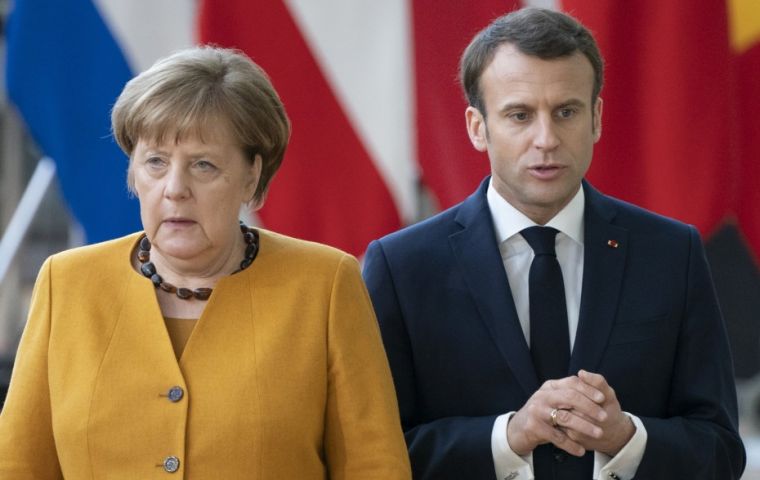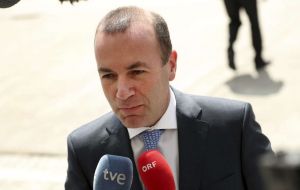MercoPress. South Atlantic News Agency
Macron and Merkel disagree on EU's key jobs following parliamentary election
 German Chancellor Angela Merkel wants centre-right candidate Manfred Weber as the next EU Commission president
German Chancellor Angela Merkel wants centre-right candidate Manfred Weber as the next EU Commission president  But French President Emmanuel Macron did not even mention Mr Weber as a contender for the influential position.
But French President Emmanuel Macron did not even mention Mr Weber as a contender for the influential position. France and Germany have disagreed on who should take one of the EU's key roles as leaders from the bloc met following parliamentary elections. The vote saw the big centrist blocs lose their majorities with Greens and nationalists gaining ground.
German Chancellor Angela Merkel wants centre-right candidate Manfred Weber as the next EU Commission president. But French President Emmanuel Macron did not even mention Mr Weber as a contender for the influential position.
Their comments came at a meeting on Tuesday in Brussels, which was a chance for EU leaders to discuss the new political landscape and who might take over the top jobs.
The elections left the EU more fragmented with the chances of reaching consensus more difficult.
The President of the European Council, Donald Tusk, said Brexit was a factor behind a majority of voters favoring pro-EU parties.
“As Europeans see what Brexit means in practice, they also draw conclusions. Brexit has been a vaccine against anti-EU propaganda and fake news.”
UK Prime Minister Theresa May took part in talks but Mr Tusk said Brexit was not discussed.
The commission is the body that enforces EU rules and drafts EU law, and its presidency is currently held by Jean-Claude Juncker, who is at the end of his five-year term.
In 2014 Mr Juncker was chosen to head the Commission as the centre-right European People's Party (EPP) candidate, after the EPP had won the election.
But it is a much tougher challenge this time for the EPP's candidate Manfred Weber - a German - after his bloc shrank from 217 seats to 180 in the 751-seat parliament, although it remains the biggest grouping.
After the talks, Mrs Merkel, said she stood by Mr Weber, but “others stand by their candidate, which is obvious”.
Earlier in the day, Mr Macron had said he did not want to talk about names, but also mentioned three, none of them Mr Weber. He later refused to name a favorite candidate, saying he wanted them to be “the most charismatic, creative and competent possible”.
Several others are in the running, among them chief Brexit negotiator Michel Barnier, who is French, Danish liberal Margrethe Vestager and Dutch centre-left candidate Frans Timmermans.
The other top EU officials to be replaced later this year are: European Council President Donald Tusk (Polish); European Central Bank President Mario Draghi (Italian) and EU High Representative for Foreign Affairs Federica Mogherini (Italian).
After lengthy negotiations, the new top officials will take up their posts on 1 November, except for the new European Council chief, who starts on 1 December.
The EU has committed to balance gender, political affiliation and geography when it fills its top jobs.
The leaders of the 28 member states will have to compromise with each other, and with MEPs who get to approve the choice. The European Parliament has watered down its demands for the selection of the president of the European Commission, issuing a statement which says the winner only had to be someone “who made his/her program and personality known prior to the elections, and engaged in a European-wide campaign”.
That potentially opens the door to candidates who weren't strictly candidates before, such as Margrethe Vestager or maybe even Michel Barnier.
The previous front-runner Manfred Weber admits that his political family lost seats at the election which weakens his claim on the job.
There are also hints that the European Parliament will focus its efforts on defining the EU's future direction, rather than seeking a powerful role in picking its personnel. A lot of names will come and go and rise and fall before the process eventually comes to an end later this year.




Top Comments
Disclaimer & comment rulesCommenting for this story is now closed.
If you have a Facebook account, become a fan and comment on our Facebook Page!